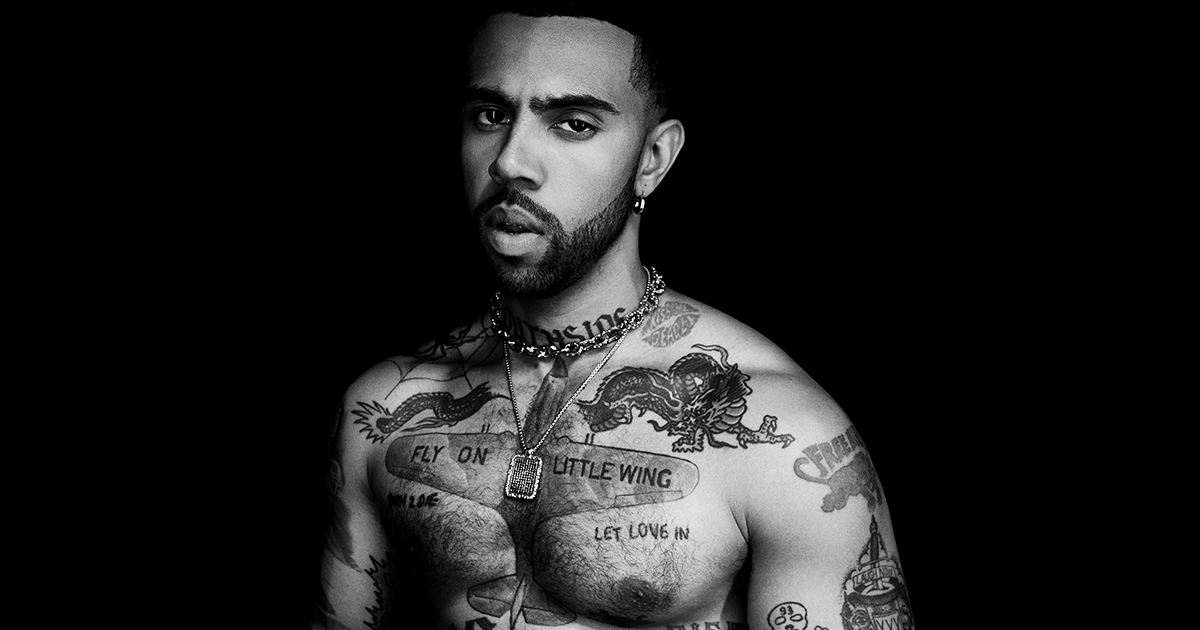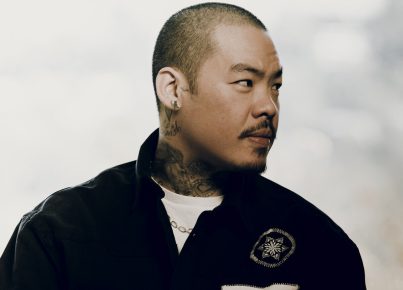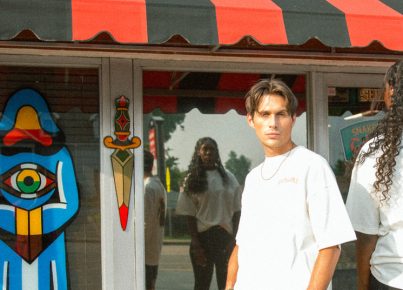Photos by Jason Goodrich
The ragtag Chicago kid turned untouchable rapper Vic Mensa has never been one to take his position for granted. While disquieting circumstances colored his upbringing before entering a musical career, they also allowed him to understand the world at a deep level. Now, he proudly uses his wisdom to not only create art that touches millions, but to carry on the Ghanaian roots that raised him. Since Mensa last spoke to Inked, he has dropped a number of projects that have cemented his name in the world of conscious hip hop. Simultaneously, he has continued digging into his core to understand both where he came from and where he’s going. In this era, Mensa is ready to present the freest version of himself to the world.
“The past two years, for me, have been a period of intense self-reflection, adjustment, discipline and patience,” Mensa says. One of the most resounding aspects of Mensa’s character is his disposition that views life in a grand, cosmic sense. His last full-length album, “The Autobiography,” dropped in 2017—over five years ago, which might have some artists scrambling to push out the next big thing, but Mensa wasn’t worried. “I try not to view my journey in the context of days and hours and months and years,” he says. “My path, my purpose, is not success, but the transformation of my entire family from generations of poverty. That’s not beholden to an album cycle or song release or music video—that’s the reason I’m on this planet.”

Fighting for survival in his youth resulted in some deep-seated thought patterns Mensa has had to gradually unlearn. “Growing up in Chicago was America 101 in a lot of ways,” he says. “It was a beautiful, traumatic experience. There are a lot of things I have to work through emotionally and mentally because I come from such a violent environment.” At the same time, Mensa credits his surroundings for influencing his art, along with his “ability to speak truth to power and [his] perspective on affluence and poverty in a significant way.” Though it hasn’t been easy to carry the torch of his forebears, it’s a duty he shoulders proudly. “I’m grateful for having mentors that are from the lineage of The Black Panther Party,” he adds, “for having mentors that are OG gang members and poets and authors. Today, I feel equipped to be the best me I can be and be a champion for my family, even it was difficult as fuck to get here.”
Recently, Mensa has been spending more time in Ghana, building relationships and being with his family. Tuning into his culture has enabled him to create new structures in massive ways, such as holding the Black Star Line Festival this past January. The event, founded by Mensa and Chance the Rapper, was launched in hopes of connecting Black Americans to their African roots through communal cultural celebration. After a successful execution, Mensa reminisces on its euphoric times. “[We were] just having fun and working with the artists,” he says. “Staying out late and listening to music. Having conversations on the beach, watching the sunrise after being at the club all night, riding motorcycles through the hood.” Mensa, aware of the African-American community’s lack of accessibility to their past, simply wishes to share with others the same kinship he’s found. “To have that connection to my ancestry, I gotta know it’s a privilege,” he says. “Because most of my closest friends don’t have that. I believe that knowing where you come from gives you a roadmap to where you wanna go.”

Throughout his career, Mensa has fluctuated through a multitude of musical styles. Most often, his sound takes the form of hard-hitting, conscious hip hop, dancing with elements of trap and R&B. In 2019, he forayed into punk music with the album “93 Punks.” Though this was a bit of an unexpected turn for the artist, Mensa cites he was “just having fun, honestly.” Growing up, the rapper had always listened to rock before hip hop. He loved playing guitar, listening to Green Day, Rage Against the Machine and Joy Division, so it felt natural to go in that direction. “I don’t feel confined to a single genre, or really subscribe to categorization in general,” he says. “I just make what I feel.”
Additionally, some of his most meaningful work has come from collaborating with artists he truly connects with, such as the one and only Pharrell. “You know when you meet somebody you’ve always wanted to,” he recalls, “and everything just goes right?” Once while in the studio together, Mensa was undergoing a distressing experience having to do with stolen money and plotting a revenge scheme. Pharrell, able to tell the young prodigy was troubled, gave Mensa what he thought was the “illest advice.” “He told me, ‘You’re lucky for three reasons,’” Mensa says. “One, you’re not the kind of man that calls someone a brother and robs them. Second, this is not gonna tank you. Third, you have the power to let this go.” After internalizing the truth of Pharrell’s words, Mensa recalls, “I made a dope song, and then never thought about it again.”

In Inked’s last conversation with Mensa, he mentioned his intrigue in scarification, as well as covering up his negative tattoos. At the moment, he’s still in the midst of these endeavors, but not without trying. His favorite artist, Ryan Flaherty—whom Mensa notes is a tattoo purist, for he never clout-chases—is someone the rapper always longs to get tattooed by. However, the tattooer’s mode of booking out months in advance doesn’t always favor Mensa’s schedule. “I don’t even know where I’m going three days from now,” he says. So far, he has gotten a fighter plane on his chest from Flaherty, signifying his birth on D-Day. The pause in tattoo progress is nothing to sweat, though. He’ll always get a chance to sit in that chair, but the past couple of years have seen him changing the world around him as opposed to his appearance. In due time, however, the body modifications are sure to catch up.
Mensa’s intentions behind getting tattoos stems back to his initial lure to art. “I feel like I’m always trying to represent myself through art,” he says. “With tattoos, I’m trying to symbolize something in my life or my ideals. I love art, you know what I mean? That’s expressed through my clothing, my conversations, my actions. My tattoos are just another way.” In terms of his favorite tattoo, Mensa proudly asserts that “it’s always gonna be [his] first one”—a black panther on his shoulder with the words “Free Huey” written above it, an homage to the political activist and co-founder of The Black Panther Party. “It’s just so pure,” he says. “From when I was 16, it was done in a ghetto apartment on the West Side. I’m gonna have a hard time beating that one. You know how people get terrible first tattoos? I got a hard first tattoo.”

Though Mensa stands atop a mountain of accomplishments, the rapper still sees it as only the beginning. Garnering success has never just been about enjoying the fruits of his labor. Through every undertaking, he upholds his responsibility to give voice to those without one, and to leave the world in a better place. “I have so many projects,” he says. “Ultimately, I see my future going in an incredibly, unbelievably upward trajectory. I see my music career, following and creative output multiplying by 10. I see my fans multiplying by 100. I see my potency, lyricism, musicality, hooks and production multiplying by 1,000.”
Beyond music, Mensa projects his philanthropic impact to raise into the hundreds of millions of dollars, so that he may continue honoring previous generations and setting the stage for every upcoming one: “That’s just the way I see things.”







